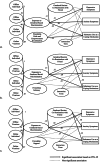The Role of Friendship in Mediating and Moderating the Relationship Between Exposure to Gendered Racism and Mental Health among Young Women of Color
- PMID: 39747761
- PMCID: PMC12018516
- DOI: 10.1007/s10964-024-02130-3
The Role of Friendship in Mediating and Moderating the Relationship Between Exposure to Gendered Racism and Mental Health among Young Women of Color
Abstract
Young women of color frequently face discrimination, reflecting the intersecting societal influences of sexism and racism. Although friendships play a significant role in women's lives, there is a lack of research on the role of friendships in navigating exposure to gendered racial discrimination (in-person and social media) and associated mental health. This study investigated the extent to which the content of friendship conversations (i.e., co-rumination against gendered racism, socializing messages related to gendered racial pride and empowerment and oppression awareness) and perceived friendship intimacy and support mediated or moderated the positive association between exposure to gendered racism and mental health. Co-rumination was tested as a mediator, while the other variables were examined as moderators. Online survey data were collected from 339 cisgender women aged 18-24 (M age = 20.90, SD = 1.96; 32.74% Asian, 33.92% Black, and 33.33% Hispanic or Latina; 68.14% identified as straight or heterosexual). Participants described friendship communications and perceived intimacy and support with a same gender and race close friend. Exposure to gendered racial discrimination was significantly associated with depressive and anxiety symptoms and substance use as a coping mechanism. Co-rumination about gendered racism was positively correlated with depressive and anxiety symptoms. Conversely, pride and empowerment socialization was negatively associated with substance use for coping, while oppression awareness socialization was positively correlated with depressive and anxiety symptoms. Structural Equation Modeling Analyses indicated that co-rumination partially mediated the relationship between gendered racism exposure and anxiety symptoms, with other friendship indices not moderating these associations. These findings highlight co-rumination about gendered racism as a risk factor for young women of color and underscore the importance of exploring how the multifaceted nature of friendships is associated with exposure to gendered racism and mental health.
Keywords: Co-Rumination; Discrimination; Friendship; Gendered Racism; Mental Health; Social Media.
© 2024. This is a U.S. Government work and not under copyright protection in the US; foreign copyright protection may apply.
Conflict of interest statement
Compliance with Ethical Standards. Conflict of Interest: The authors declare no competing interests. Ethical Approval: This study was approved by Fordham University IRB. Informed Consent: Informed consent was obtained from all individual participants included in the study.
Figures


Similar articles
-
Applying intersectionality to explore the relations between gendered racism and health among Black women.J Couns Psychol. 2017 Oct;64(5):475-486. doi: 10.1037/cou0000231. J Couns Psychol. 2017. PMID: 29048194
-
Gendered racism and the sexual and reproductive health of Black and Latina Women.Ethn Health. 2020 Apr;25(3):367-392. doi: 10.1080/13557858.2018.1439896. Epub 2018 Feb 15. Ethn Health. 2020. PMID: 29447448
-
Let's talk: The impact of gendered racial socialization on Black adolescent girls' mental health.Cultur Divers Ethnic Minor Psychol. 2022 Apr;28(2):171-181. doi: 10.1037/cdp0000484. Epub 2021 Aug 19. Cultur Divers Ethnic Minor Psychol. 2022. PMID: 34410753
-
Intersectional discrimination and its impact on Asian American women's mental health: A mixed-methods scoping review.Front Public Health. 2023 Feb 27;11:993396. doi: 10.3389/fpubh.2023.993396. eCollection 2023. Front Public Health. 2023. PMID: 36923035 Free PMC article.
-
Contributions of Black psychology scholars to models of racism and health: Applying intersectionality to center Black women.Am Psychol. 2023 May-Jun;78(4):576-588. doi: 10.1037/amp0001141. Am Psychol. 2023. PMID: 37384509 Review.
References
-
- Adler, N. E., Epel, E. S., Castellazzo, G., & Ickovics, J. R. (2000). Relationship of subjective and objective social status with psychological and physiological functioning: Preliminary data in healthy, White women. Health Psychology, 19(6), 586. - PubMed
-
- Ahn, L. H., Keum, B. T., Meizys, G. M., Choudry, A., Gomes, M. A., & Wang, L. (2022). Second-generation Asian American women’s gendered racial socialization. Journal of Counseling Psychology, 69, 129–145. 10.1037/cou0000575. - PubMed
-
- American Psychiatric Association. (2013). Diagnostic and statistical manual of mental disorders: DSM-5 (Vol. 5, Issue 5). American psychiatric association Washington, DC. 10.1176/appi.books.9780890425596.
-
- Are, C. (2020). How Instagram’s algorithm is censoring women and vulnerable users but helping online abusers. Feminist Media Studies, 20(5), 741–744. 10.1080/14680777.2020.1783805.
MeSH terms
Grants and funding
LinkOut - more resources
Full Text Sources
Medical

